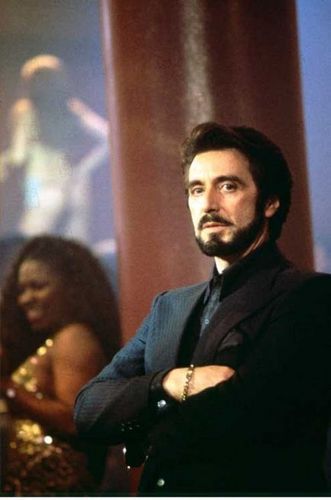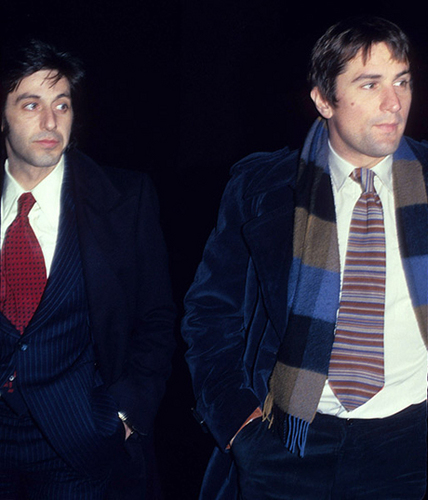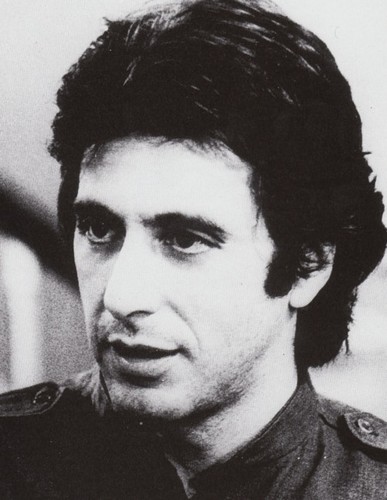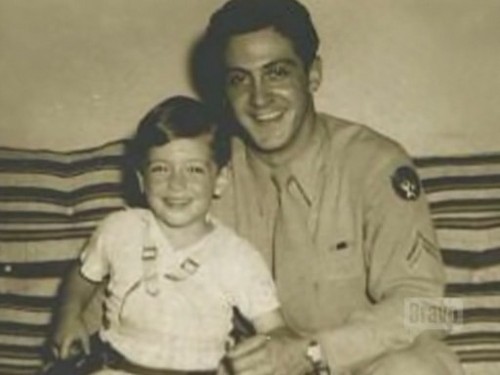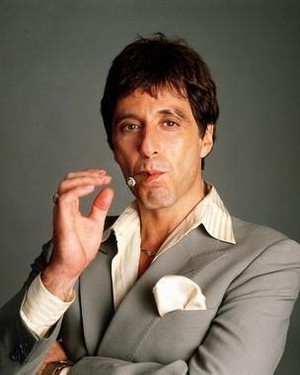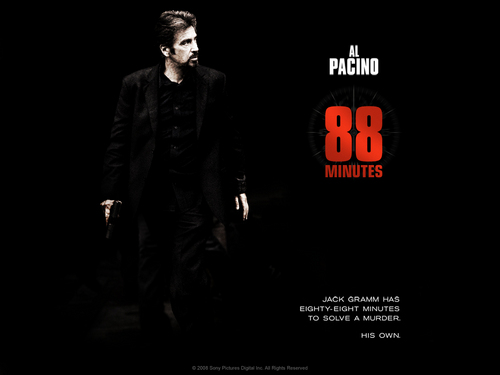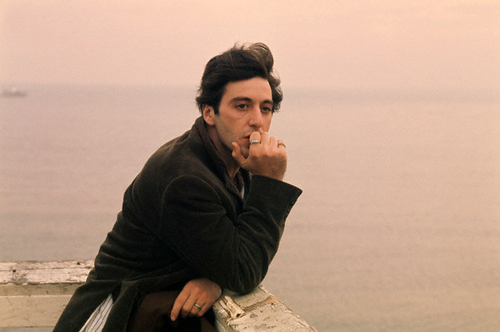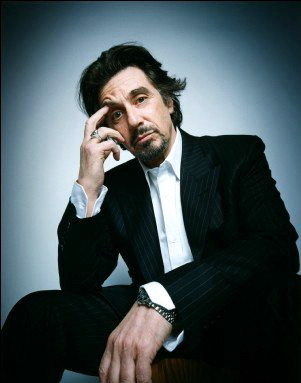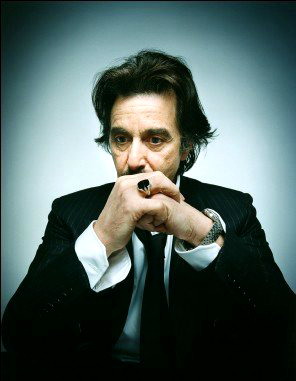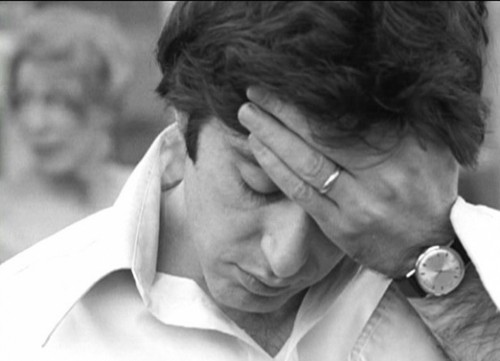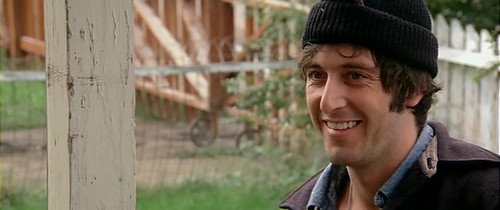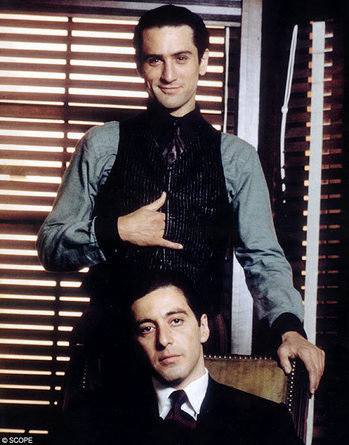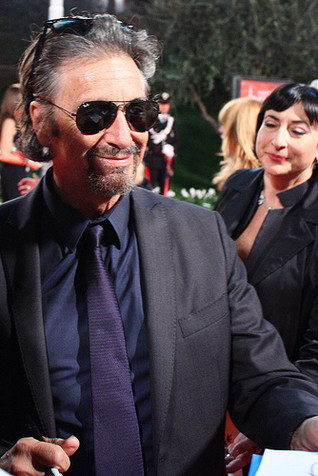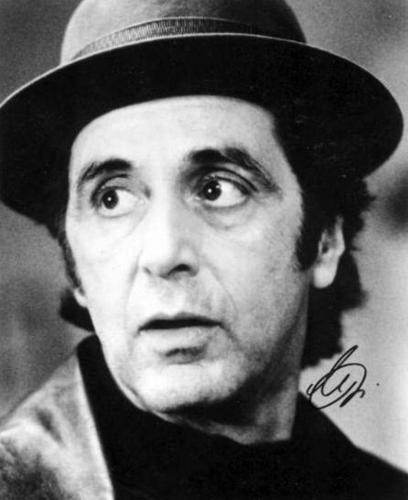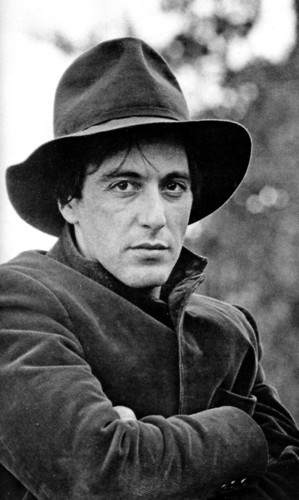At times during our conversation, he was humble and even self-deprecating about his own achievements. “I like talking about something I know very, very little about, like acting,” Pacino said, though the twinkle in his eye underscored the wisdom of his years of experience. Now, he’s interested in passing some of that experience on — especially to his three children, whom he spoke of proudly. As our discussions on filmmaking, fame, family and the aging process demonstrated, he has a lot he wants to say — though with Al Pacino, getting to the point is always a journey unto itself.
***
Q: We have cameras in the room right now, shooting footage for Salomaybe. Are you acting now? Is this the real you?
A: Well, after looking at Salomaybe, I don’t know who the hell the real me is. I think it’s closest now to the real me because for one thing, I’m used to this. I’m naturally shy but I’ve done this so much and you get better at it than you would think.
Q: After attending the screening of Salomaybe, I walked away feeling like there were two films there: one a behind the scenes of this play, Oscar Wilde’s Salome, and one a behind the scenes with Al Pacino. In which direction are you trying to go?
A: When you do these things, you sort of take the journey. The journey is all about how I can interweave the Oscar Wilde story, the story of Salome, the play itself and what it is, what it contains, and my journey as an actor, as a director, as a filmmaker, as a person struggling with whatever I’m struggling with – my own celebrity, my own life. This is semi-autobiographical in terms of my commitment to this kind of thing. It’s not autobiographical in a sense where you go to my house and see my kids and stuff like that, but that’s why I guess it’s semi-autobiographical.
Q: Would you say that your mission statement or the vision you’re trying to show in Salome the play and Salomaybe the movie is different or the same?
A: They’re connected. The interesting thing about this is I don’t know what my vision is yet about it. I’m sensing something and I’m going along with it. It reminds me of a painting, the way Jackson Pollack painted – Jackson Pollack, the great, great artist. He said, “I destroy the painting as soon as I can see what it is. When I can make out something in it, I destroy it because it’s no longer coming from my unconscious.” We’re in the process of cutting it down a little bit and making it more articulate, giving it more balance so that it’s palatable. I’m not going to try to go far, because then you’re defeating the purpose, but then how far can I go? Is it possible to do something that that makes an audience uncomfortable, challenges them, makes them see things they’re not used to? Here in these films, I have the opportunity to say something about how I feel about things. It’s my presentation, my vision of the world. Not so much to satisfy the audience at large. And that’s an unusual experience for actors in movies.
Q: We definitely get to see a different side of you in the scene where you explode backstage.
A: I think what you see is an artist having this fit of temperament.
Q: Did you learn anything about yourself from watching that?
A: I found out how temperamental I am, yes. And that sometimes that can be kind of off-putting. I’m not a violent person, never was, but I have this temperament that I’ve always displayed. I guess it has to do with my tradition and being Italian, we’re very outgoing with our emotions.
Q: What do you hope to achieve by letting the audience see your scenes behind the stage?
A: There was once a great actor named George C. Scott. He was on stage in the Delacourt Theater in Central Park, where they do Shakespeare every summer, and he was playing Shylock in The Merchant of Venice. At one point he took the robes he was wearing and just started flipping them up in the air, out of nowhere. And later, an actor said to him, “What was that, George, what were you doing?” And he said, “They were sleeping.” You’re always trying to catch them. We’re charlatans in a way, we’re magic people. Part of the behind the scenes stuff is to loosen you up, to make you feel that you are experiencing this. This is my style, I did it in Looking for Richard, too. And I figure, if I can weave it into the actual play and get the audience interested, like the robes going up and down, they’ll pay attention long enough to consume it.
Q: How did you develop this style?
A: I’m an actor, and everything about me – the way I perceive things, the way I have seen the world – has been in relation to characters and how I would want to play something or not play it. I never saw myself as a director. It’s certainly a second language but making movies for 40 years, you pick stuff up. However, this style of making movies, this documentary style, is easier for me because I gather a lot of material and with an editor, write it on screen. You try to write based on what you shot. I don’t know how much it has to do with directing, but it has a lot to do with spontaneity and what happens when you put the right thing together.
Q: What was the most memorable thing you picked up?
A: We were doing Scarface many years ago…and I remember having my coffee and looking at the beach, the surf, and I saw a hundred people looking out into the ocean. I thought, what’s going on? Did some whale get washed up to shore? So I stood up on the table to see what it was, and it was the director, Brian De Palma, standing there alone by the surf and they were all waiting for him. And I never forgot that because it represented to me what a director is, what a director does.
Q: How has making your own films affected your relationship with directors?
A: I understand the directors much more. I was always rebelling against them when I was a youngster, I didn’t want to be told what to do. I had no identification. If you can identify with people, you can empathize with people and therefore you understand things. I mean, this guy Cheney, our vice president. I don’t think he’d understand gay marriage if he didn’t have a gay daughter. Do you? I don’t know, he doesn’t seem the type. To be really obvious about something, if somebody straps an M1 on your shoulder and throws you in Iraq, you’re going to get a sense of what the hell’s going on there. Boy, you’ll wake up fast when bullets are flying over your head.
Q: What are your feelings on the war in Iraq?
A: I don’t like what’s going on in Iraq, naturally. I’m part of a large majority of people who don’t, but I do not know the whole story. I do not believe what I see on television. I believe a percentage of it, so it’s hard for me to discern. I don’t like what it’s doing to the world. But I don’t like a lot of things like that, I never did. Being in a position of celebrity and having your words carry such unnatural weight…I’ve always been a bit squeamish when it came to that kind of thing. You take a guy like George Clooney who goes out there to Darfur, and gets things done! That’s magical. He’s done a great thing.
Q: Why did you decide to join him in the cast of Ocean’s 13?
A: It’s a great group, and it was an opportunity to work with Steven Soderbergh. But mainly? It was shot in L.A. and I want to be next to my kids. So I’ve been doing everything that has to do with being next to them, close to them.
Q: Rumor has it your oldest daughter, Julie Marie, is going to be a softball player at UCLA.
A: She’s a great ballplayer, which I wanted to be. She did make four films by the time she was 14 but we’re not going to talk about that.
Q: If she took Professor Grobel’s class, would you come back and be an interview subject again for it?
A: Yeah, but she’d leave the room.
Q: She’s already been in the movies – if one of your children showed a talent or curiosity for acting, what advice would you give them?
A: I can see it in my oldest daughter. I don’t know how long she’ll run away from it, but it’s there in her. I haven’t encouraged her or discouraged her. I let her go her own way. I did say to her that I thought that she had a real gift, and it’s a good idea to know that. It’s always good to go with your gift.
Q: How have your children reacted to your fame?
A: Pretty soon I’ll start worrying about that because they carry my name and they have that exposure. The whole thing is, they never asked for it, that kingdom. I once asked my oldest daughter if she thought about changing her name in school and she said, “No, I’m a Pacino. That’s my name.” I just wondered how it would feel, how people would treat her, but she’s adjusted so marvelously. When she was 5 or 6 years old, we were in an Italian restaurant, and these people came by the table and they would start talking to me, asking me for my autograph and she just went under the table.
Q: Do you remember the poem you wrote when your twins were born?
A: I probably write a poem every 50 years. I had these little babies and it gave me something so spectacular, such a feeling – I was so turned on and so excited by them that I wrote a poem. I had it on scraps of paper and the maid threw it out.
Q: When you came here tonight, you mentioned chronicling your life because the end is near. Are there any lessons you’d like to leave on this tape for your youngest children?
A: My best advice to any young person is, if you want kids, be careful who you have them with. That’s my mantra.
Q: You still haven’t settled down and gotten married.
A: It’s difficult. I’ve had very deep relationships that lasted for long periods of time with people – you could almost call them marriages, even though I didn’t marry. But it was costly. There are a couple of times I would’ve liked to have married. I think I made a mistake, especially once.
Q: You’re being very open tonight, but in your film Chinese Coffee, Jake feels violated because he says that Harry has stolen his life by writing this book. Did you ever feel that way about Professor Grobel, with him publishing the book of conversations?
A: Larry has the illness of all writers, he can’t help himself. You’re talking to him and all of a sudden, you say, “He’s puttin’ that in his cash register!”
Q: Are you satisfied with the book that he’s written?
A: It was a compromise. There was a sense that I could write my own memoirs, and Larry would help me down the line, or maybe not, maybe he was too close to me. I didn’t want the book out, naturally – Larry knew that for 20 years, 15 at least, I didn’t want anything written about me. Then, you know, things happen, finally it’s OK and I trust Larry. Nothing about it is salacious in any way.
***
Q: We have cameras in the room right now, shooting footage for Salomaybe. Are you acting now? Is this the real you?
A: Well, after looking at Salomaybe, I don’t know who the hell the real me is. I think it’s closest now to the real me because for one thing, I’m used to this. I’m naturally shy but I’ve done this so much and you get better at it than you would think.
Q: After attending the screening of Salomaybe, I walked away feeling like there were two films there: one a behind the scenes of this play, Oscar Wilde’s Salome, and one a behind the scenes with Al Pacino. In which direction are you trying to go?
A: When you do these things, you sort of take the journey. The journey is all about how I can interweave the Oscar Wilde story, the story of Salome, the play itself and what it is, what it contains, and my journey as an actor, as a director, as a filmmaker, as a person struggling with whatever I’m struggling with – my own celebrity, my own life. This is semi-autobiographical in terms of my commitment to this kind of thing. It’s not autobiographical in a sense where you go to my house and see my kids and stuff like that, but that’s why I guess it’s semi-autobiographical.
Q: Would you say that your mission statement or the vision you’re trying to show in Salome the play and Salomaybe the movie is different or the same?
A: They’re connected. The interesting thing about this is I don’t know what my vision is yet about it. I’m sensing something and I’m going along with it. It reminds me of a painting, the way Jackson Pollack painted – Jackson Pollack, the great, great artist. He said, “I destroy the painting as soon as I can see what it is. When I can make out something in it, I destroy it because it’s no longer coming from my unconscious.” We’re in the process of cutting it down a little bit and making it more articulate, giving it more balance so that it’s palatable. I’m not going to try to go far, because then you’re defeating the purpose, but then how far can I go? Is it possible to do something that that makes an audience uncomfortable, challenges them, makes them see things they’re not used to? Here in these films, I have the opportunity to say something about how I feel about things. It’s my presentation, my vision of the world. Not so much to satisfy the audience at large. And that’s an unusual experience for actors in movies.
Q: We definitely get to see a different side of you in the scene where you explode backstage.
A: I think what you see is an artist having this fit of temperament.
Q: Did you learn anything about yourself from watching that?
A: I found out how temperamental I am, yes. And that sometimes that can be kind of off-putting. I’m not a violent person, never was, but I have this temperament that I’ve always displayed. I guess it has to do with my tradition and being Italian, we’re very outgoing with our emotions.
Q: What do you hope to achieve by letting the audience see your scenes behind the stage?
A: There was once a great actor named George C. Scott. He was on stage in the Delacourt Theater in Central Park, where they do Shakespeare every summer, and he was playing Shylock in The Merchant of Venice. At one point he took the robes he was wearing and just started flipping them up in the air, out of nowhere. And later, an actor said to him, “What was that, George, what were you doing?” And he said, “They were sleeping.” You’re always trying to catch them. We’re charlatans in a way, we’re magic people. Part of the behind the scenes stuff is to loosen you up, to make you feel that you are experiencing this. This is my style, I did it in Looking for Richard, too. And I figure, if I can weave it into the actual play and get the audience interested, like the robes going up and down, they’ll pay attention long enough to consume it.
Q: How did you develop this style?
A: I’m an actor, and everything about me – the way I perceive things, the way I have seen the world – has been in relation to characters and how I would want to play something or not play it. I never saw myself as a director. It’s certainly a second language but making movies for 40 years, you pick stuff up. However, this style of making movies, this documentary style, is easier for me because I gather a lot of material and with an editor, write it on screen. You try to write based on what you shot. I don’t know how much it has to do with directing, but it has a lot to do with spontaneity and what happens when you put the right thing together.
Q: What was the most memorable thing you picked up?
A: We were doing Scarface many years ago…and I remember having my coffee and looking at the beach, the surf, and I saw a hundred people looking out into the ocean. I thought, what’s going on? Did some whale get washed up to shore? So I stood up on the table to see what it was, and it was the director, Brian De Palma, standing there alone by the surf and they were all waiting for him. And I never forgot that because it represented to me what a director is, what a director does.
Q: How has making your own films affected your relationship with directors?
A: I understand the directors much more. I was always rebelling against them when I was a youngster, I didn’t want to be told what to do. I had no identification. If you can identify with people, you can empathize with people and therefore you understand things. I mean, this guy Cheney, our vice president. I don’t think he’d understand gay marriage if he didn’t have a gay daughter. Do you? I don’t know, he doesn’t seem the type. To be really obvious about something, if somebody straps an M1 on your shoulder and throws you in Iraq, you’re going to get a sense of what the hell’s going on there. Boy, you’ll wake up fast when bullets are flying over your head.
Q: What are your feelings on the war in Iraq?
A: I don’t like what’s going on in Iraq, naturally. I’m part of a large majority of people who don’t, but I do not know the whole story. I do not believe what I see on television. I believe a percentage of it, so it’s hard for me to discern. I don’t like what it’s doing to the world. But I don’t like a lot of things like that, I never did. Being in a position of celebrity and having your words carry such unnatural weight…I’ve always been a bit squeamish when it came to that kind of thing. You take a guy like George Clooney who goes out there to Darfur, and gets things done! That’s magical. He’s done a great thing.
Q: Why did you decide to join him in the cast of Ocean’s 13?
A: It’s a great group, and it was an opportunity to work with Steven Soderbergh. But mainly? It was shot in L.A. and I want to be next to my kids. So I’ve been doing everything that has to do with being next to them, close to them.
Q: Rumor has it your oldest daughter, Julie Marie, is going to be a softball player at UCLA.
A: She’s a great ballplayer, which I wanted to be. She did make four films by the time she was 14 but we’re not going to talk about that.
Q: If she took Professor Grobel’s class, would you come back and be an interview subject again for it?
A: Yeah, but she’d leave the room.
Q: She’s already been in the movies – if one of your children showed a talent or curiosity for acting, what advice would you give them?
A: I can see it in my oldest daughter. I don’t know how long she’ll run away from it, but it’s there in her. I haven’t encouraged her or discouraged her. I let her go her own way. I did say to her that I thought that she had a real gift, and it’s a good idea to know that. It’s always good to go with your gift.
Q: How have your children reacted to your fame?
A: Pretty soon I’ll start worrying about that because they carry my name and they have that exposure. The whole thing is, they never asked for it, that kingdom. I once asked my oldest daughter if she thought about changing her name in school and she said, “No, I’m a Pacino. That’s my name.” I just wondered how it would feel, how people would treat her, but she’s adjusted so marvelously. When she was 5 or 6 years old, we were in an Italian restaurant, and these people came by the table and they would start talking to me, asking me for my autograph and she just went under the table.
Q: Do you remember the poem you wrote when your twins were born?
A: I probably write a poem every 50 years. I had these little babies and it gave me something so spectacular, such a feeling – I was so turned on and so excited by them that I wrote a poem. I had it on scraps of paper and the maid threw it out.
Q: When you came here tonight, you mentioned chronicling your life because the end is near. Are there any lessons you’d like to leave on this tape for your youngest children?
A: My best advice to any young person is, if you want kids, be careful who you have them with. That’s my mantra.
Q: You still haven’t settled down and gotten married.
A: It’s difficult. I’ve had very deep relationships that lasted for long periods of time with people – you could almost call them marriages, even though I didn’t marry. But it was costly. There are a couple of times I would’ve liked to have married. I think I made a mistake, especially once.
Q: You’re being very open tonight, but in your film Chinese Coffee, Jake feels violated because he says that Harry has stolen his life by writing this book. Did you ever feel that way about Professor Grobel, with him publishing the book of conversations?
A: Larry has the illness of all writers, he can’t help himself. You’re talking to him and all of a sudden, you say, “He’s puttin’ that in his cash register!”
Q: Are you satisfied with the book that he’s written?
A: It was a compromise. There was a sense that I could write my own memoirs, and Larry would help me down the line, or maybe not, maybe he was too close to me. I didn’t want the book out, naturally – Larry knew that for 20 years, 15 at least, I didn’t want anything written about me. Then, you know, things happen, finally it’s OK and I trust Larry. Nothing about it is salacious in any way.


